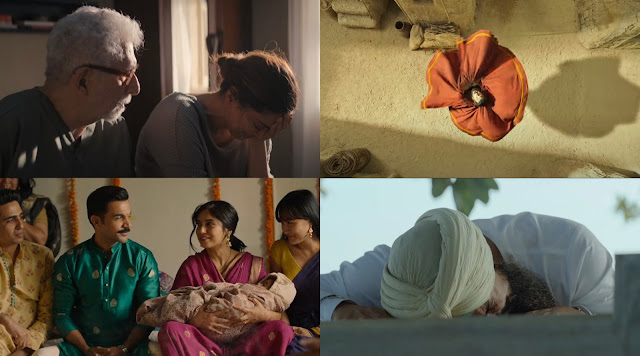
It is almost the end of the first quarter of 2023. It is late to talk about the films of 2022, but given how slowly I watch films, it is only recently that I managed to see some of the films of last year. As I do every year, I write about some scenes that come to my mind when I think about the films of 2022. Like it was in 2021, there were not many good films to watch, but compiling a few notes on some of my favorite moments.
1. Gehraiyaan: Shakun Batra's Gehraiyaan is my favorite film of the year. It has a profoundly poignant scene between Alisha (Deepika Padukone) and her father, Vinod (Naseeruddin Shah), who tells her that she has to accept her past and choose to move on. There is no need to run away because we all are bigger than our mistakes. A sobbing Alisha asks, "Do my choices even matter, Papa?" Her father tells her, "Yeh jaanane ka toh ek hi tareekha hai. You give yourself a chance." Like her mother, Alisha blamed everything on her ill-fated luck. She and her mother used to play a game of snakes and ladders. When her mother lost the game, she said, "Bad luck, I guess." Her father had advised her mother the same thing, that one can always start again, even after losing. It is a choice even though it is difficult. Our past does not have to stop us from changing our present. Gehraiyaan is a lovely gem of a film. And, yes, no one can cry as gracefully as Deepika Padukone.

2. Gangubai Kathiawadi: Sanjay Leela Bhansali's biopic on the eponymous madame of a brothel gave Alia Bhatt another feather in her cap. The film has some stunningly created Bhansali-esque moments. Early on, one of the girls in the brothel asks Gangu (Alia Bhatt) to write a letter to her father. She agrees to help her write it. Taking turns, all the other girls add a few words of their own to the letter. This is the perfect example of shared sisterhood. Another lovely scene is one when Kamli (Indira Kumari) dies, and all the other women dress her up while she is lying dead. On the other side sits Gangu holding Kamli's child in her hands. The scene is set up wonderfully, showing different contrasts. There is red and white. There is a mother and child. There is life and death. There is the end of life and the beginning of life. Gangu then asks to tie her legs as men cannot be trusted with women, even in graves. And there is also the very gorgeous Meri Jaan, a one-take song sequence shot at the back of the car.
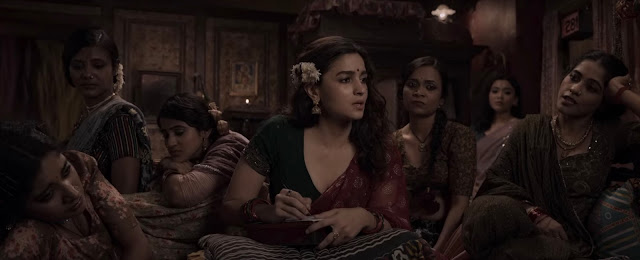

3. Laal Singh Chaddha: Advait Chandan's adaptation of Forest Gump is a beautiful film about the power of stories. The film's most memorable scene also talks about the stories of our lives. After the death of his beloved Rupa (Kareena Kapoor), Laal (Aamir Khan) visits her grave, which lay below the tree that was their special place. A Sikh man sobs in front of the grave of his Christain wife. He talks to her about stories. He says that his mother told him everything in life is pre-destined and written from before, although he does not know who wrote it. He wonders if the things that happen to us are under our control or if we are just drifting along. It may be both, he concludes. Like the song Kahani that also said, "Kya pata hum mein hai kahani, ya hai kahani me hum?" Are we the story, or is the story in us? Stories are everywhere in Laal Singh Chaddha.
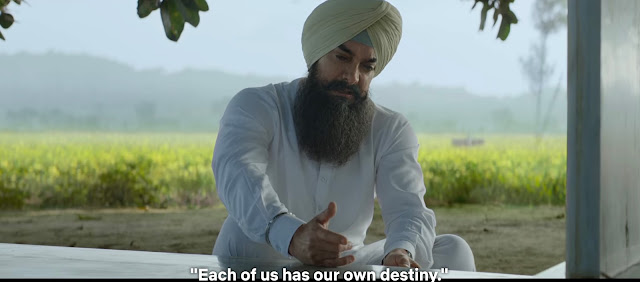
4. Badhaai Do: Harshavardhan Kulkarni's second feature film is the story of a lavender marriage. The male protagonist Shardul (Rajkummar Rao) is gay. He is a policeman but so scared of anyone discovering his sexuality that he feels like a thief. He sports a heavy mustache and has built up muscle, hiding in the guise of masculine symbols. He marries Sumi (Bhumi Pednekar), who is also gay, for the sake of his family. The film's best scene is when he finally comes out to his family. Films usually depict characters moving towards homosexuality when they are ignored in heterosexual relationships and advocate that sexuality is a choice. Badhaai Do, after Ek Ladki Ko Dekha Toh Aisa Laga, refutes this notion of choice. Shardul states that the 'feeling' comes from the inside. Nobody chooses to be gay or straight (or bisexual). He talks about his loneliness and inability to share his secret with anyone. Then, his mother (Sheeba Chaddha), who has been treated like an outcast all her life because of being a widow, hugs him. The scene also has a memorable character placement. All the family members sit opposite Shardul, while only his mother sits behind him. The film has another beautiful moment in the climax when Sumi's father (Nitesh Pandey) nudges Rimjhim (Chum Darang) to sit with the baby's parents. There are no grand statements or crying at this moment. A quiet nod between Sumi and her father was all that was needed for his acceptance. It is profoundly moving. The colors in this climax scene, especially in the costumes of the two couples, are so distinct as if nodding to the colors of pride.
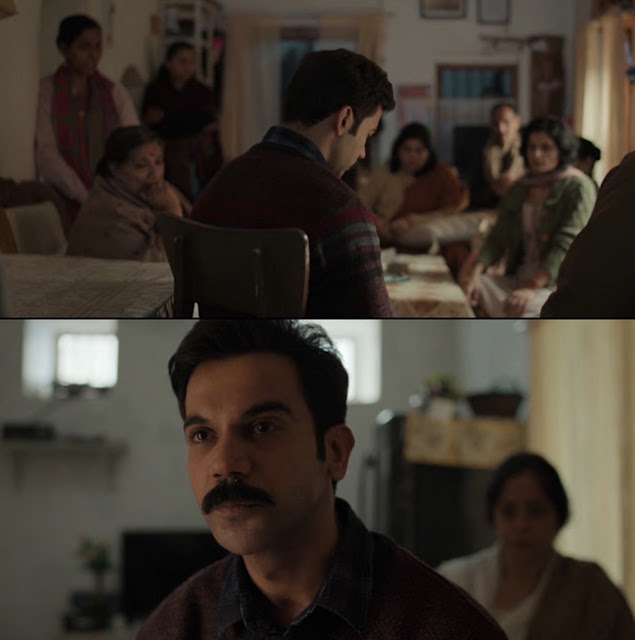

5. Shamshera: Ranbir Kapoor had two film releases in 2022. Ayan Mukerji's Brahmastra did not work for me, but Karan Malhotra's Shamshera, though not particularly great, had more things that engaged me. The father-son revenge drama showed some aspects of nature. The crows come to the rescue. The bees move together in a swarm. The tree provides space to keep gold. The sand dances with the music. But the best thing about Shamshera is the charming Ji Huzoor that yet again depicts the dancing skills of Ranbir Kapoor. He has a fluidity of movement, making even tricky steps look so effortless. The song is choreographed by Chinni Prakash with innovative use of spaces—the alleys, the windows, the trolleys, and the kids. My favorite part is the one when he falls through a fold of chairs right on the beats, as if the chairs are dancing as well. It is superb.
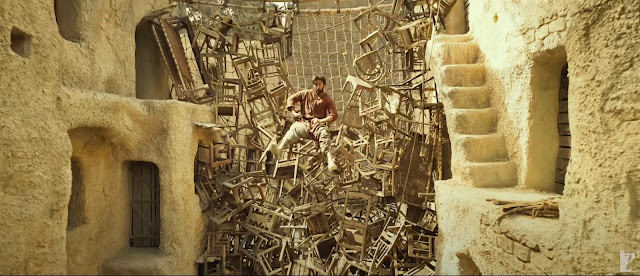

6. Qala: Anvitaa Dutt's film on the life of a singer dealing with mental health issues had some gorgeously framed scenes. However, the most memorable bit of the film is the conversation between Qala (Tripti Dimri) and her friend Majrooh (Varun Grover), likely named after the famous Majrooh Sultanpuri. Like Dr. Sudip (Parambrata Chatterjee) from Bulbbul, Majrooh is the feminist ally. He wears red nail paint on all his fingers. He is also some kind of prophecy teller. Majrooh sees Qala's continued sexual abuse at the hands of Sumant Kumar (Amit Sial). He tells her if she allows it, it will keep on happening. Today, the producer has the power; tomorrow, she will have the power. Times will change. Daur badlega, daur ki yeh puraani aadat hai. In the next moment, his prophecy comes true. The camera people who used to follow Sumant Kumar started following Qala. The film depicts this power change through height, where Qala is on a higher pedestal while Sumant Kumar watches her from below. She is mobbed by the media while he stands alone. In another symbolic moment in the film, a disgraced Sumant comes to Qala's house, hoping to sign her for his next movie. He looks at himself in the mirror, wearing a pristine white shirt. The mirror, however, is stained and rusted, making his shirt appear dirty, symbolizing the stains in his past. Qala had many more stunning shots, especially some in the snow.


7. Love Hostel: Shanker Raman's film brings Bobby Deol as a psychopathic maniac hunting lovers who don't follow the norms of caste hierarchy. The film's most memorable scene is when Jyoti (Sanya Malhotra) and Ashu (Vikrant Massey) are on the run and take shelter in an old factory. While waiting there, a red car enters. The duo gets suspicious that there are people in the car who are probably sent to kill them. Jyoti takes a gun to the car to find out more. But it is not what they expected. The car has two lovers, both men, who were making out. She seems slightly disgusted, but then it hits her; the two men are lovers, like herself and Ashu. They are also running away from society. Lovers belonging to the same gender are not accepted by society, like lovers belonging to different religions face opposition. At this precise moment when she realizes this, she sees and hears a peacock chirping nearby. It is a tender moment reminding us of the beauty while dealing with the barbarity of a cruel world.
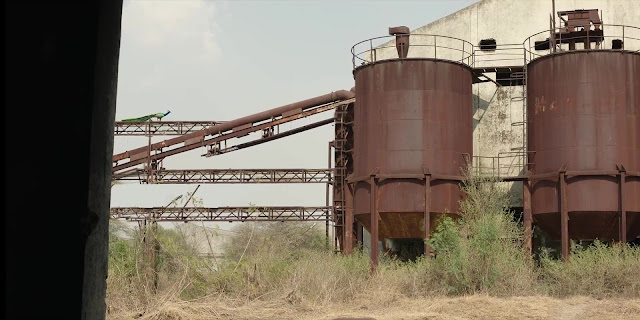
8. Jalsa: Suresh Triveni's film tells the story of two mothers, Maya (Vidya Balan) and Ruksana (Shefali Shah). When Ruksana finds out the truth about Maya being the car driver that hit her daughter, it appears that she decides to take revenge. She takes Maya's son Ayush (Surya Kasibhatla) to the land's end, a place where there is nowhere else left to go. Ruksana, however, does not take the final step. Because an eye for an eye makes the whole world blind. She could have left Ayush to drown, but she did not. She comes out as a bigger person in the end. Earlier in the film, Ayush and Ruksana laugh at the haanthi-cheenti jokes. The power dynamics are so imbalanced in favor of the elephant that any ant's action seems comical. But, sometimes, an ant too can exert a different kind of power by its choices. After all, as we saw in the case of Ruksana, power manifests not just physically but also morally. Jalsa should also be credited for having one of the best sound design in films.

9. Goodbye: Vikas Bahl's film on the death of a family member is largely inert. I really wanted to like it but could not. It is dull and boring. However, there is a thoughtful scene that I still remember when I think of the film. There is a scene when Tara (Rashmika Mandana) and Pandit Ji (Sunil Grover), who had been arguing about the irrationality of faith, have some sort of reconciliation. Pandit Ji asks Tara where she learned to play the ukulele. She said that she learned it on her own. He then tells her that when you first play the tune and then learn how it was created, it is faith—vishwaas. And, when you first learn how the tune was created and then play it, it is science. But eventually, it is the same tune. In the context of the film, it supports irrationality, but I also believe it is an attempt to not be utterly dismissive of things one does not understand. Remember the scene in Friends where Phoebe and Ross argue about whether evolution exists. She does not believe in evolution, while Ross tries every trick to convince her that it does; after all, his entire professional life is based on studying it. She says, "Wasn't there a time when the brightest minds in the world believed that the world was flat? And, up until like what, 50 years ago, you all thought the atom was the smallest thing, until you split it open, and this like, whole mess of crap came out. Now, are you telling me that you are so unbelievably arrogant that you can't admit that there's a teeny tiny possibility that you could be wrong about this?"
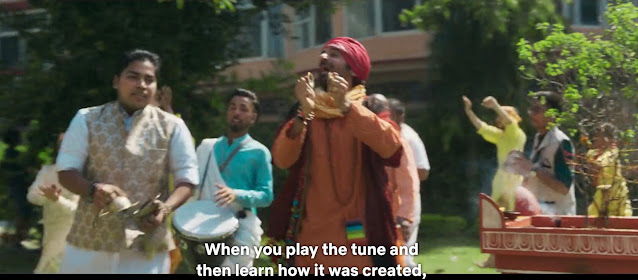


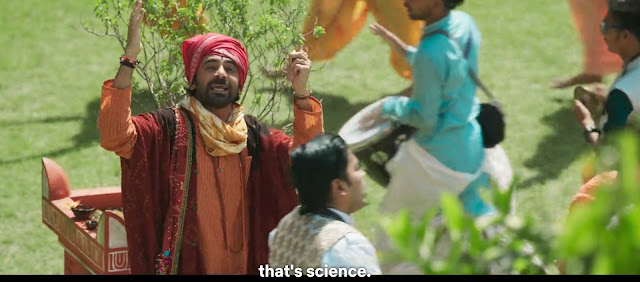
10. Monica, O My Darling: Vasan Bala's neo-noir comedy is a lot of fun. While it has its share of moments (such as the scene at the Hotel Prince Amar), this film is memorable because of its music, especially the three songs—Yeh Ek Zindagi, Bye Bye Adios, and Love You So Much. Anupama Chakraborty Shrivastava and Sarita Vaz are simply fantastic. The other thing about the film is Radhika Apte's hilarious dialogue, "Somvaar ko main sab pe vishwaas karti hun."

11. Sharmaji Namkeen: Rishi Kapoor's swansong, directed by Hitesh Bhatia, tells the story of a widowed man trying to make sense of his newly retired life. Sharmaji (Rishi Kapoor/Paresh Rawal) takes up cooking for kitty parties and becomes friends with a group of lovely women. His son Rinku (Suhail Nayyar) is opposed to his new profession. There is a scene where Veena (Juhi Chawla) and Sharmaji talk about their life. She tells him about the death of her husband. And then says she has to keep busy in life. It is a lovely little moment in a lovely little film. And, yes, Laal Tamatar is so much fun.

Honorable mentions:
The cinematography in Thar, the top shots in Drishyam 2, the historical retelling in Dasvi, the Savitri-Satyavan story in Looop Lapeta, the conversation at the riverbank in Uunchai, the lead pair not ending up together in Doctor G, the Khala-Zulfi kiss in Darlings, and the crossing of the bridge in Modern Love: Mumbai. I have not seen the following films, but I do plan to watch them at some point—Bhediya, Jaadugar, Jersey, Ram Setu, RK/Rkay, and Vikram Vedha.
Other Reading:
1. On Gehraiyaan—Link
2. On Gangubai Kathiawadi—Link
3. On Laal Singh Chaddha—Link
4. On Qala—Link
5. On Love Hostel—Link
6. On Jalsa—Link
7. On Monica, O My Darling—Link
8. On Darlings—Link
Dialogue of the Day:
"Jo bhi honda who hum karde hain, ya hawa wich aiweyi udte phirde rehte hain, idhar udhar."
—Laal, Laal Singh Chaddha

No comments:
Post a Comment
Post a comment